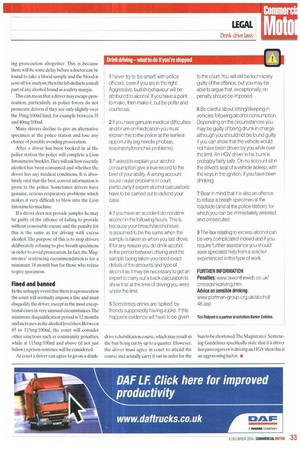Drink driving —what to do if you're stopped
Page 33

If you've noticed an error in this article please click here to report it so we can fix it.
1 Never try to be smart with police officers, even if you are in the right Aggressive, bullish behaviour will be attributed to alcohol. If you have a point to make, then make it, but be polite and courteous.
2 If you have genuine medical difficulties and/or are on medication you must explain this to the police at the earliest opportunity (eg needle phobias, respiratory/bronchial problems).
3 If asked to explain your alcohol consumption give a true record to the best of your ability. A wrong account could cause problems in court, particularly if expert alcohol calculations have to be carried out to defend your case.
4 If you have an accident do not drink alcohol in the following hours. This is because your breach/alcohol level is assumed to be the same when the sample is taken as when you last drove. If for any reason you do drink alcohol in the period between driving and the sample being taken you need exact details of the amounts and type of alcohol as it may be necessary to get an expert to carry out a back calculation to show that at the time of driving you were under the limit.
5 Sometimes drinks are 'spiked' by friends supposedly having a joke. If this happens evidence will have to be given to the court. You will still be technically guilty of the offence, but you may be able to argue that, exceptionally, no penalty should be imposed.
6 Be careful about sitting/sleeping in vehicles following alcohol consumption. Depending on the circumstances you may be guilty of being drunk in charge, although you should not be found guilty if you can show that the vehicle would not have been driven by you while over the limit. An HGV driver in his bunk is probably fairly safe. On no account sit in the driver's seat of a vehicle asleep, with the keys in the ignition, if you have been drinking, 7 Bear in mind that it is also an offence to refuse a breath specimen at the roadside (and at the police station), for which you can be immediately arrested and prosecuted, 8 The law relating to excess alcohol can be very complicated indeed and if you require further assistance you should seek specialist help from a solicitor experienced in this type of work.
FURTHER INFORMATION Penalties: www.lawontheweb.co.uk/ crimedrinkdriving.htm Advice on sensible drinking: wwvv.portman-group.org.uk/alcohol/ 48.asp
Tim Ridyard is a partner at solicitors Barker Gotelee.


























































































































































































